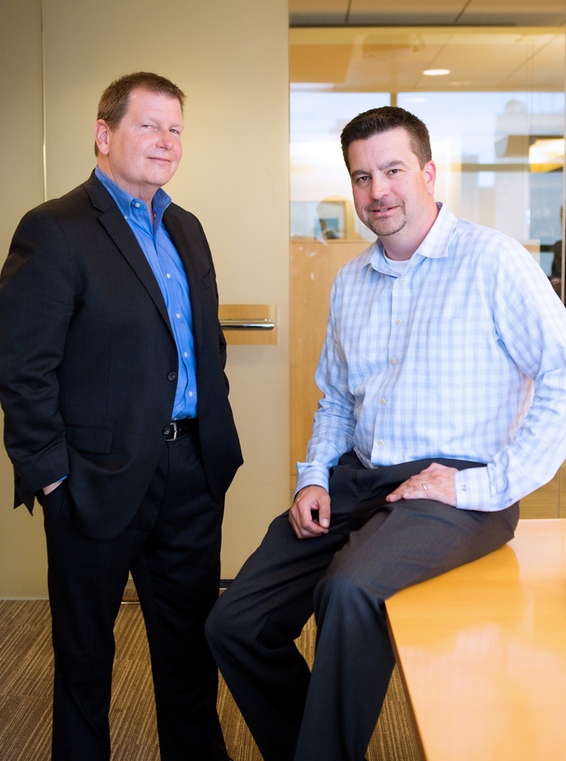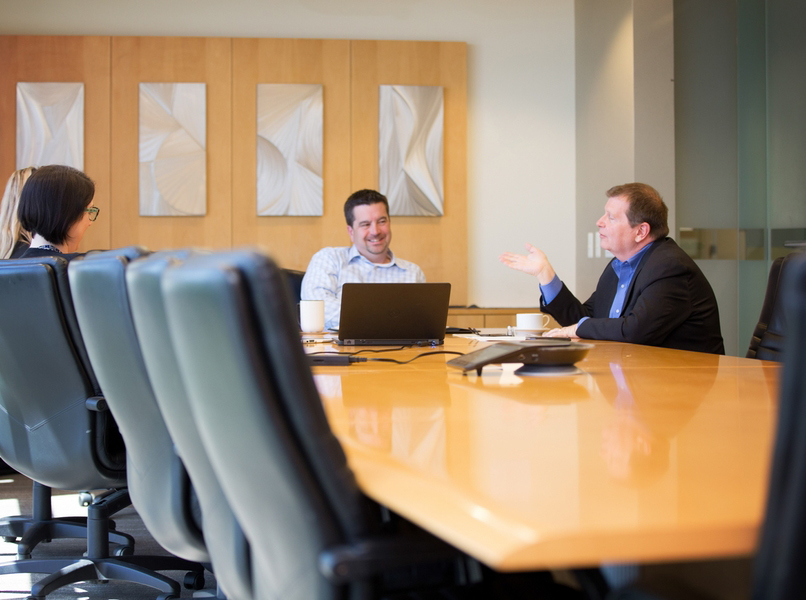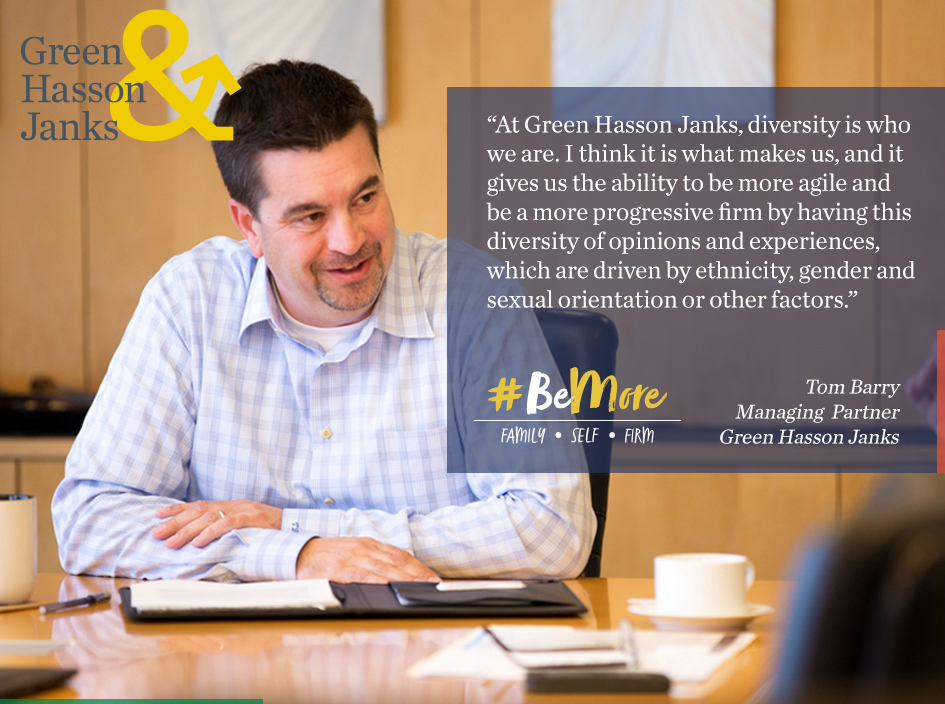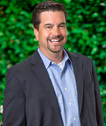
The world is changing, with new technologies making it easier to connect than ever before, and thus easier to work 24/7 with people across the globe. But while these changes mean great things for business, they also mean traditional companies need to change their mindset to compete against more progressive business models for the limited talent pool available. The paradigm shift that is occurring, and must continue, is what inspired our #BeMore culture here at GHJ. We realized that while it is easy to get sucked into working crazy hours and being constantly attached to our phones and computers, it is important for employees to take a step back and take care of themselves. We push all our employees to #BeMore every day for themselves, their families and for the firm. This does not mean doing more, but focuses on the fact that it is alright to take a break from work and do something important to you so you can come back fresh and refocused.
I recently had a conversation about diversity and inclusion with Stanley Bissey, now Executive Director of the Los Angeles County Bar Association (LACBA), a long-time GHJ client. Stan has been involved with associations in multiple states for many years – for judges, lawyers, lobbyists and doctors. During our conversation we talked about the challenges of running a century-old organization and how we have had to evolve our practices and adapt a #BeMore-style culture to stay on top.
Making an Impact
TOM BARRY: Tell us about where you started and what led you LACBA.
STANLEY BISSEY: I have a 20-plus year career in associations in multiple states and various practice areas from doctors to lawyers to judges, to even a brief stint with an environmental organization, and I am a firm believer in the power of associations to effect positive change. The opportunity to combine my love of the law, the rule of law, judges and lawyers with a part of the state that I love seems like the perfect opportunity; so it has been three months, and hopefully it will be a lot longer.
TOM BARRY: Between judges, attorneys and lobbyists, you have covered almost every angle. So what do you think you can do that will have the greatest impact in this role; make the greatest difference in your leadership role in the association?
STANLEY BISSEY: You have to be willing to adapt to change, and associations are no different than any other industry. We have to be at the forefront in meeting our members’ needs, and the challenge for a 140-year-old organization is that many of our members are multi-generational. Adapting to those changing perceptions of what it means to be a lawyer, and offering fulfilling opportunities – like our pro-bono opportunities, in addition to the cutting edge CLE that everybody needs – but also to celebrate the intangibles of being a lawyer and to justify to some folks that, “Yeah, I just spent a hundred, two hundred thousand dollars on a career that hopefully I feel proud about doing and being a part of.” And that is our mission as well.
TOM BARRY: You talked about your love for associations and their ability to promote change or drive change. One of the elements for LACBA is a number of their volunteer-led programs for the Counsel for Justice, domestic violence, veterans’ legal services, immigrant legal assistance, AIDS legal services. Since we are here, out the windows you can see the VA. What is being done around veterans’ programs at the association – now and in the future?
STANLEY BISSEY: You mentioned the four projects. The one project that seems appropriate, given your location here, is the Veterans Legal Services Project. I do not think it is a surprise to many people that veterans face a challenge coming back from their service in the military. Often it is hard to find a job. It is no secret to anyone who lives in Los Angeles, or any major metropolitan city, that the homeless face challenges – specifically veterans – and it is just one small part of that component of homelessness and unemployment, and sometimes substance abuse, for folks that have given their all for this country.
Diversity and Inclusion
TOM BARRY: In a city like Los Angeles, which presents, really, a quilt of everything, good and bad, there is a draw for great opportunities for these programs to be brought forward. As Chairman of the American Society of Association Executives Diversity and Inclusion Committee, how do you plan to ensure diversity, or continue to ensure diversity and inclusion in the bar association’s programming?
STANLEY BISSEY: The ABA has a fantastic diversity program that identifies young emerging leaders, gets them into the pipeline at various points in their career so that they can then rise, and raises their level of exposure. It is not any different than what we are trying to do at LACBA. Our current president, Michael Meyer, and incoming president, Bryan Kabateck, created this Vice President of Diversity Inclusion and Outreach, so it is a commitment on their part at the board level, to recognize the need for diversity not only in Los Angeles but throughout California, and to outreach to those communities through the affinity bar associations and others to make the case that there is an opportunity for you to effect change. The association is also creating a diversity award to recognize outstanding leaders.
TOM BARRY: So that will be like firms who are members.
STANLEY BISSEY: Firms or individuals. We are also trying to create the Diversity Leadership Academy, like the ASAE, where I was and still am involved. I was chair of the diversity committee. I joined that committee initially because so much of the focus was on race and gender, but there are so many other facets to diversity. Moving forward in LACBA, emerging Diversity Leadership Academy is much like what ASAE did, which was called the Executive Diversity Leadership program. It opens the doors to a lot of folks and the only requirement of them is to pay it forward, to recommend future scholars and to hopefully be good stewards of the law for us.
TOM BARRY: And then a product of that is all the associations they represent, right – which is pretty far reaching. You mentioned that diversity is not just about gender or ethnicity, which I firmly agree with, and I think that oftentimes the diversity conversation gets complicated because people only look at it that way. And what diversity really is, is diversity of thought and experience and background, perspective and all these different elements.
We went through a strategic visioning process a few years ago. We identified diversity as who we are. We do not try to be diverse, we are diverse, and everything is gender, ethnicity, background, place of origin, religion, sexual orientation, experience, education. That sounds ridiculous, but for us to bring a non-accountant into an accounting firm was really about having all these different perspectives and experiences, which makes us better. That resonates with me completely. Even when you look at diversity within the accounting profession, when you keep it in the confines of gender, you need to be aware of the fact that there are different pathways to success. One of the challenges we identified in public accounting is looking at the fact that everyone starts their career at the same spot and people have different agendas in terms of where they want to end. You have two people who want to become a partner in a CPA firm. The ability to create alternative career paths is easier to say than do, but it is the acceptance of those people actually sitting there. It is not just creating the program or the opportunities. It is also culturally changing mindsets for people to be accepting of the fact that there is diversity in the way people can come up into an opportunity.
STANLEY BISSEY: Well I am personally impressed with GHJ, and I read that over half your employees are women. Was that a strategic choice or did it happen by happenstance; is it reflective of the accounting culture or the accounting pool of candidates?
TOM BARRY: I think it is any and all of that. We were founded in 1953, we had a female partner in the early 80’s, which really was groundbreaking, particularly in the world of public accounting. Public accounting is traditionally old white males; that is what the stereotypical public accountant looked like for decades. At that period in the work world it was certainly monumental to have a female partner, and when you look through the years since, we have always had female partners. We have also always been a very diverse firm, and if you look at our partner makeup now, it is diverse from an ethnic point of view also; we have three partners from India, we have three female partners, and we have a second level we call Principal, probably half of our principals are female. So it is something we are very proud of, but we also have to be intentional on those leadership roles because if we are not paying attention to it and creating those different opportunities, we can get into a situation where we are not as diverse as we should be.
Everyone has his or her own story; it is just how you hear it. For us diversity is who we are. I think it is what makes us, and it gives us, the ability to be more agile and a more progressive firm by having this diversity of opinions and experiences which are driven by ethnicity, gender and sexual orientation or other factors.

The #BeMore Paradigm Shift
TOM BARRY: With all the responsibilities that you have now in your role at LACBA, how do you manage work-life balance – not just to be successful at work but also to be healthy for yourself?
STANLEY BISSEY: Well to be healthy for one’s self is the hardest part, but I am thankful and blessed to be at a point in my career where I am in a position that allows me to set some limits. There are certain times I will not check my email, there are certain times that are business hours and there are certain times that are focused for home, out to dinner, exploring new neighborhoods or whatever it may be. I have a rule not to check emails. And, so far it has worked out. It has been a little tough with the new job only because I want to be on top of things to the extent that I can. So much of life revolves around our ability to be tethered to our phone.
Well I have heard, and I have read actually, about your #BeMore, so the life balance – can you tell me a little bit more about that and how it is incorporated into your employees and your culture here.
TOM BARRY: Public accounting is famous for hiring, churn and burn, bringing people on board, giving them a gazillion hours to work and spit out at the other end, then some swim and many sink. There was no concept of “the whole person,” it was “you are here; you committed to this firm; we sell our time so the more time we have from you the more revenues we have.” All of the intangible costs of people leaving are completely overlooked in that equation. We need to understand that the millennials – the people coming up in the profession – have a whole different outlook on life.
The fundamental truth is we do sell our time, so people do need to work, and people are working a lot. I have asked people for feedback on what they are going to do after the filing deadlines for them to be more in their lives, and it is interesting getting examples back, like going on vacation or going to museums or just spending time with their family. I think is important to show that it is okay. It has been a little more complicated for me than I thought.
I took four days off at the end of March, which is like complete heresy from a CPA. Now, did I completely take the time off? No. I was logged in, I was doing work in the mornings or the night, but actually got to take time off and balance my life and do certain things I needed to do. If I do not do that in my role then it does not show that it is all right for anyone else to do, and I think that being able to walk the walk is important.
Can I be better at it? Absolutely; however, without having that balance first, if we do not take care of ourselves, the other two things aren’t going to be taken care of. And having that balance in life is crucial to the long-term success of an individual. It will drive the long-term success the firm. I think it is super important. I have been pleasantly surprised about the reception of people. So that is #BeMore. It is about flexibility. It is giving people the tools to take command of their own life. That is the Firm’s point of view. It is making the investment to allow people to have the flexibility, and then walking the walk to set the example that it’s okay.
Looking to the Future
TOM BARRY: So last question. What is the number one challenge you face and how do you plan to tackle it?
STANLEY BISSEY: Well that is maybe the hardest question. The professional challenge, I think, is creating a bar that does all the things that people expect their professional association to do: the CLE, the discounts on insurance, the benefits of pro-bono opportunities; but it is also creating a modern bar for millennials, for new law students, the emotional support that reminds people and reinforces their career decisions that “I went to law school for a reason;” and it can be lonely. There are people who are just as lost, just as confused as I am, and creating that community. The new joiners are joiners because of the membership experience and what it means to them personally.
TOM BARRY: The sense of community.
STANLEY BISSEY: Yeah, the community. And so creating a bar that is as much that, if not more. This is a challenge given the demographics, given the fact that it is a 140-year-old organization and that is why I am thinking LACBA 10 years from now. I have my dream of how I imagine we will be. I do not know if we will get there. It is incremental change but moving a big, old, solid bar into the 21st century and beyond may be my biggest challenge.
There are many challenges ahead with retaining and attracting the best talent, and my discussion with Stanley certainly shows that GHJ is not the only firm focused on diversity, inclusion and creating a work-life balance. While I am sure LACBA will go far with Stanley at the helm, I am proud to be leading the effort at my firm.
If you want to learn more about how we #BeMore at GHJ, be sure to check out our past #BeMore blogs, and if you are interested in working with us, check out our Careers page.



